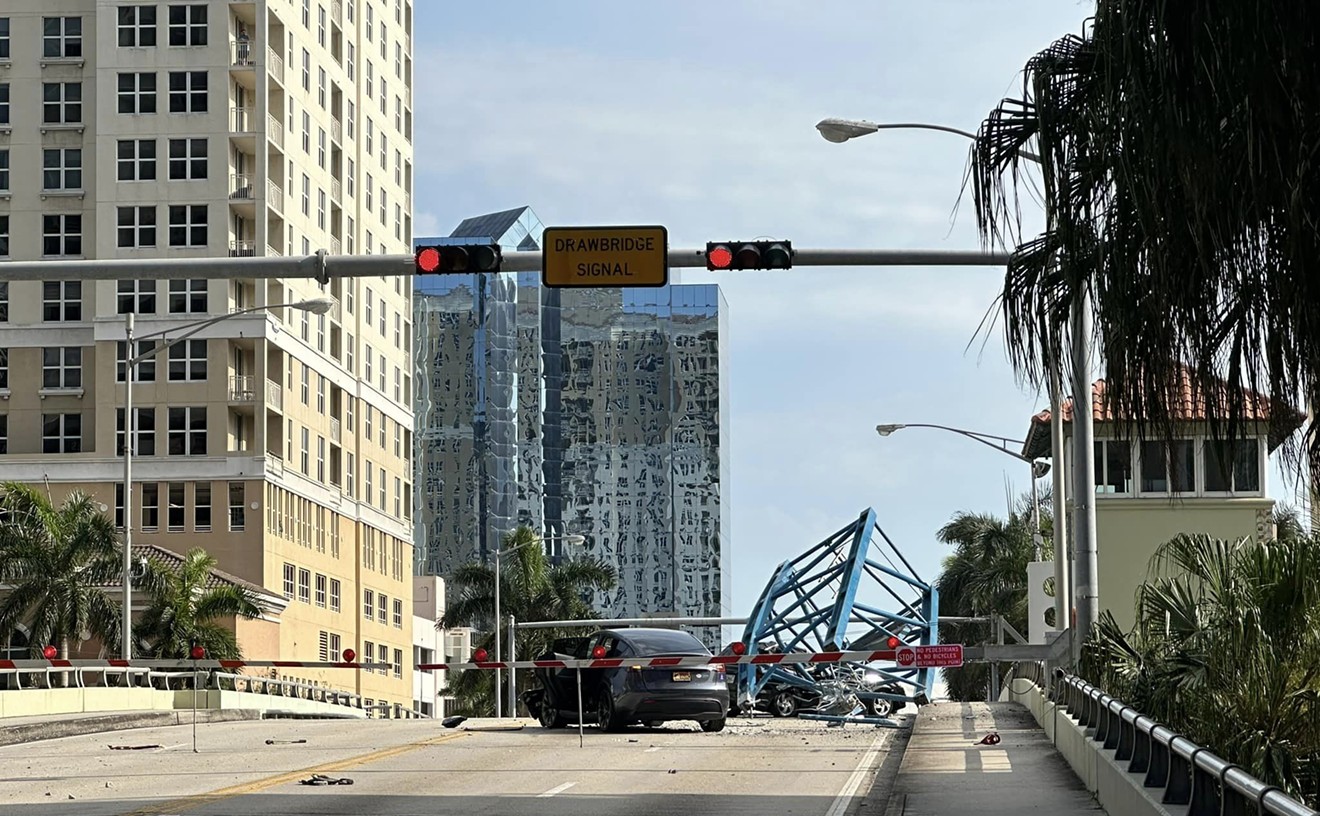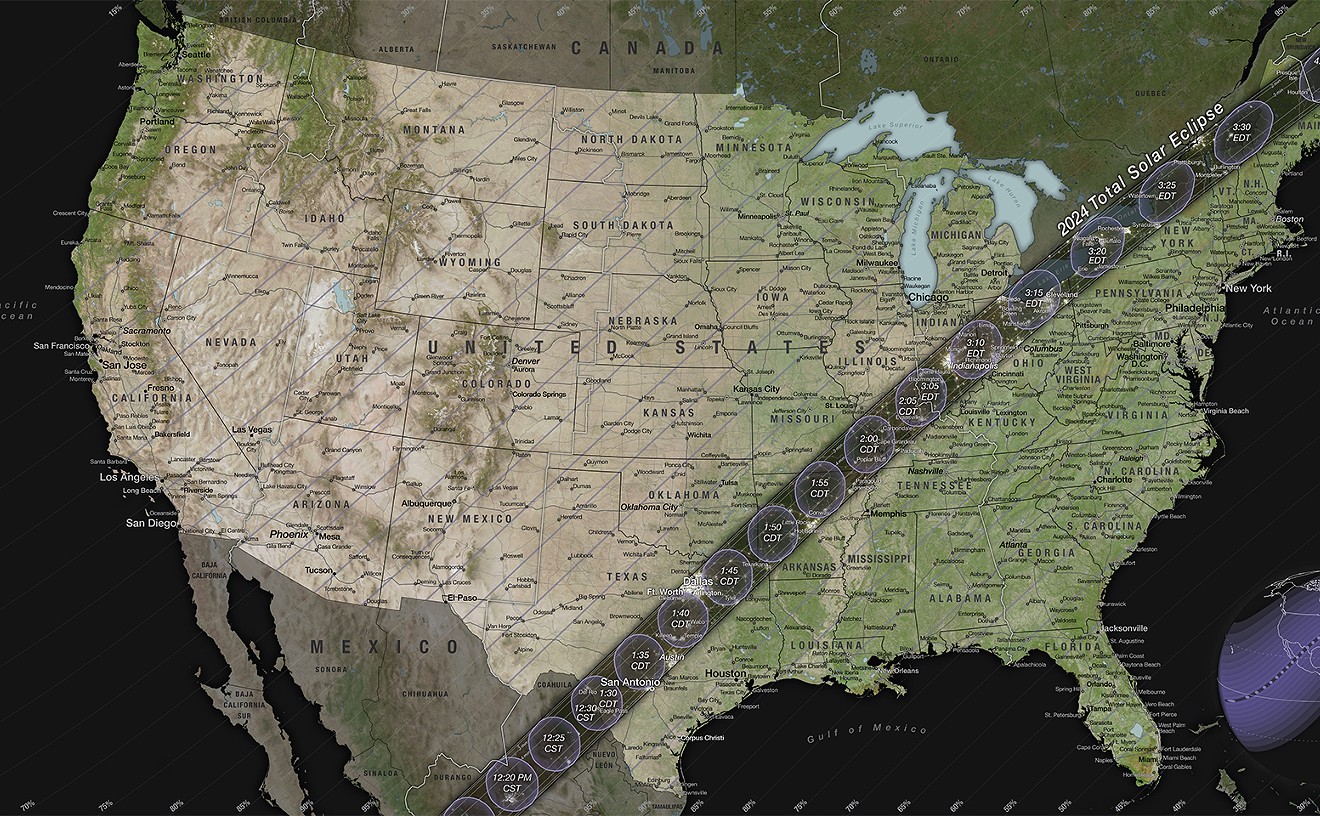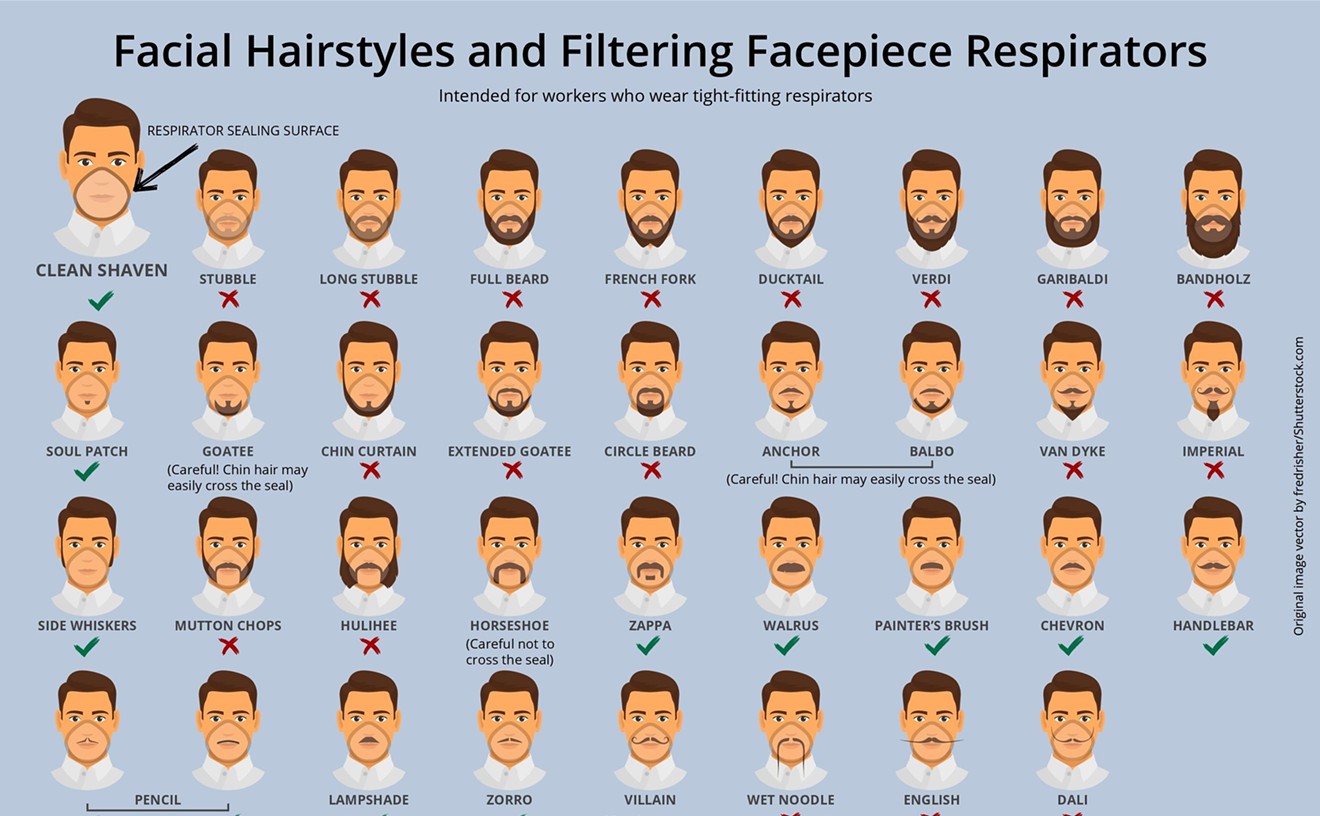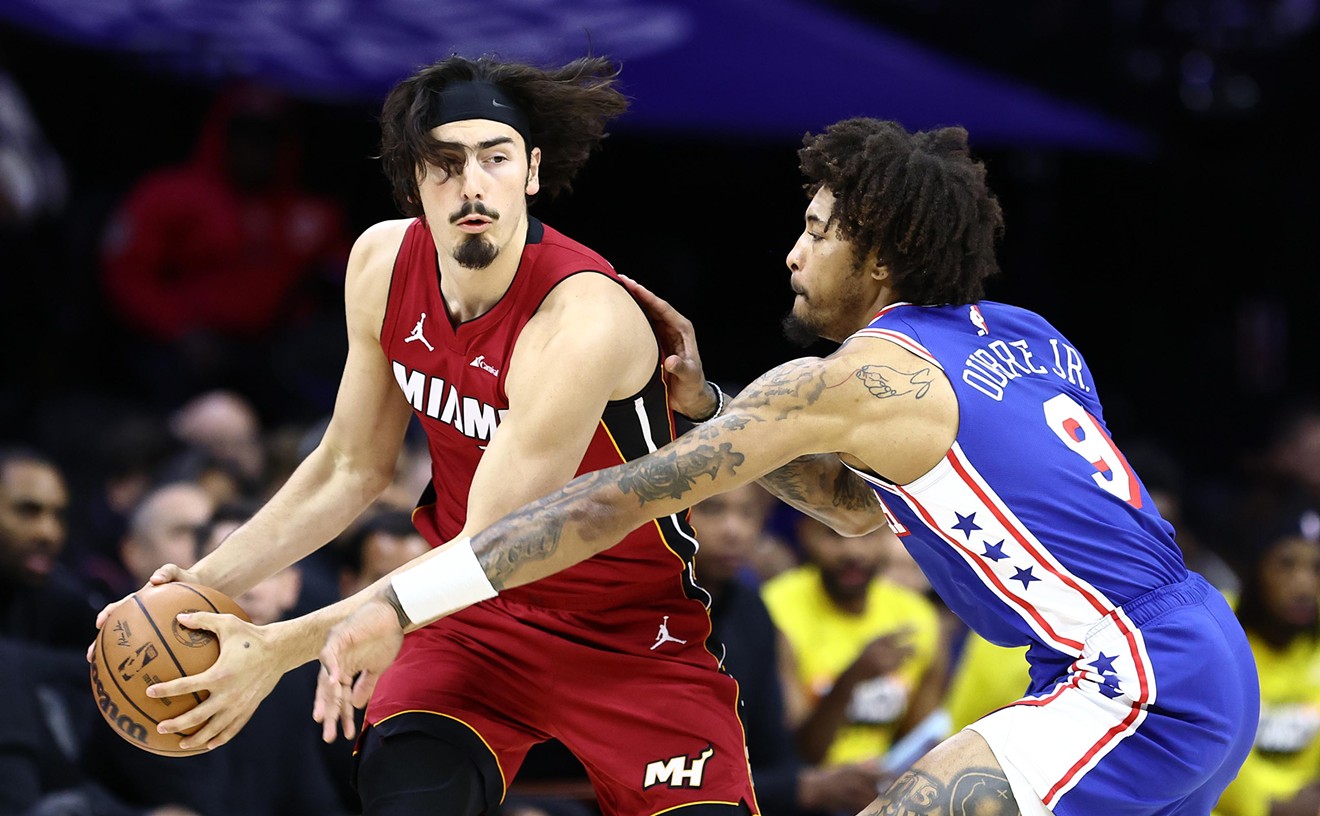A weak breeze was pushing in from the south, rippling the broad boulevard of water as it caught the midmorning sun. The canal, wide as a football field, ran north to south, slashing an engineered course through the unruly tangle of low-lying bush in Big Cypress National Preserve.
Scott Harris, a 34-year-old maintenance worker, was coasting along the east bank in an airboat, killing weeds with a hose full of poison. Decked out in a protective suit, rubber boots, glasses, and earmuffs, he was deep in the sawgrass, about a mile north of Alligator Alley and 45 minutes by car west of Fort Lauderdale. The deafening whir of the propellers overwhelmed all sound.
He looked ahead, eyeing where the wind was carrying the chemicals. Then he saw it: a floating black trash bag.
There's always junk in the canals, he thought. Maybe it's a bag of clothes.
Harris cut the engines and poled over to the bag using a 12-foot cypress stick he kept on hand for pushing off the bank. When the trash bag was in range, he tore through the black plastic with the stick's end. Inside was another layer of garbage bag. Harris ripped it open, uncovering a third. Something is wrong, he thought, laying aside the pole and hopping to the bow to rip the final layer with his hands.
Inside he saw a back pants pocket made of dark corduroy. It was a bag of clothes, he assumed. But as Harris looked closer, a flash of skin caught his eye. He was looking at a corpse curled in the fetal position.
Frantic, he pushed off. The airboat drifted a couple hundred yards. He dialed on his cell phone. No reception. He dialed again. A 911 operator answered. What seemed like hours passed. Finally, police arrived.
"I could have easily overlooked the bag, but I'm a Christian man. I believe God wanted the bag to be found," says Harris, who still has nightmares. "Now, if I see a bag that I can't see through, I don't touch it. I don't want to find more human remains."
The body was later identified as 17-year-old Marissa Karp. She had been shot through the left breast, and her face was rouged with bruises. She'd been dead only 12 hours when Harris (whose name has been changed because he fears gang retribution) opened the trash bag.
More than a month later, after police identified the body, Gary Karp received the news about his daughter. Over the next decade, he would make a superhuman effort to track down her killer, waging every battle possible to keep the case from going cold.
He would amass wheelbarrows' worth of documents and badger cops in two countries until they finally followed up on thousands of hours of his detective work. Marissa, he showed beyond a reasonable doubt, fell victim to a Bahamian drug crew that had left a string of bodies across South Florida.
His dogged work provides insight not only into the power of a father's love for his daughter but also into cartels not from Colombia or Mexico, but from a seemingly lazy collection of islands just 120 miles east of South Florida. Big rip-offs, brutal beatings, and murder of innocents were all part of their modus operandi.
Now 59 years old and disabled by a massive stroke, Gary regrets much from the years his daughter was alive. But in a halting voice, he expresses pride that Marissa's murderer might soon face arrest. "I wanted to be able to say I may have failed when my daughter was alive, but I was able to get justice for her after she was gone."
Despite his almost 40 years in South Florida, a New York glaze still covers Gary's words and bearing. He's quick with his opinion, has a wise-guy wit, and once he lights on something he wants, he doesn't give in. He exhibits surprising intensity for a guy who stands only five-foot-two and looks out on the world with soft drooping features and an awkward smile. "People love to hate me and hate to love me," he says when describing himself. "The last thing you want to do is tell me what I can't do."
Gary was born in 1953 in Queens to a Jewish family. His father worked as a mechanic for American Airlines, and his mom was an accountant for the Federal Aviation Administration. When he was about 6 years old, the family uprooted for North Woodmere on Long Island, where Gary grew up on a steady diet of '50s American truisms — cops were your friends, the courts knew right from wrong, the government was there to help. "Truth, justice, the American way, Superman, and all the rest," he says.
As a teen, he worked as a clerk at Waldbaum's, a local supermarket chain. One day Gary's eye hooked on a girl with curly black hair and brown eyes parking her car in the fire lane. He followed her through the aisles and learned her name was Susan. They dated, and when Gary moved with his parents to Florida in 1972, she followed.
He spent a few semesters at the University of Miami before leaving college for good and then trained as an EMT, eventually working five years in Dade County. The job put him up close to everything from bloody car wrecks to decapitations to shootings. He also delivered 14 babies.
The couple had a son, Josh, in 1981 and then settled in Plantation. Four years later, Marissa was born. By then, he'd traded the erratic hours of emergency work for selling copiers for Minolta. He was home that December day when Susan suddenly went into labor. He delivered Marissa on the living room floor, his medical skills kicking in when the baby emerged with the umbilical cord around her neck. By the time paramedics arrived, mother and daughter were both stable. Gary told the EMTs he'd called just so they could transport the family to the hospital. The parents married the next year.
Marissa had a close call early on, after the family had moved to Sunrise. As a toddler, she wobbled into a neighbor's yard alone. A dog viciously mauled her face. Gary feared the damage — both physical and mental — would be long-term. The little girl underwent plastic surgery and eventually was unmarked by scars, either physical or emotional. "She endured a lot, but she bounced back."
The father saw a strong independent streak brewing inside his cute little girl — characteristics she was drawing from his side of the gene pool. Sometimes it flared up in mischievous ways. The family once piled into their Toyota van after running an errand. On the road, passing drivers wailed their car horns in his direction. Gary looked back to find Marissa wasn't in the car. After pulling over, he found her hanging from a ladder running up the van's back end. His anger was quickly elbowed out by appreciation. "She was fun, a handful."
In January 1996, the family was rocked by an unexpected loss. Susan had always struggled with chronic asthma, and one day an attack hit her at home. Gary rushed her to Westside Regional Medical Center in Plantation, where she passed away. Suddenly, Gary was a single father, responsible not only for handling two kids and a job but also for juggling his own grief.
"I remember thinking my life was going to change," he recalls.
Both children took the loss hard. Marissa became more stubborn, Gary remembers. She showed flashes of uncontrollable temper at school and at home. Eventually, Gary began dating a woman he knew from the neighborhood named Francine, whose own daughter attended Walker Elementary and Westpines Middle School with the Karp kids. Francine calmed Marissa a bit. She sometimes took the girls to gymnastics or a barn where she cared for horses. Although Marissa enjoyed the outings, she continued to act out. Gary placed her in counseling, but it made little difference.
Even today, Gary won't speak much about the bumps in his relationship with his daughter. But around 1999, Marissa, then 14, left home to live with Gary's mother, Susan, in Lauderhill. According to police records, the teenager quarreled with the 85-year-old woman in early 2001, pulling her hair and swearing at her. Marissa was charged with battery, and a judge sentenced her to probation.
After she returned to her grandma's house, a second argument took place and Marissa was charged with violating her probation. Gary says he was, in a way, relieved to see his daughter inside a courtroom. She had committed a crime, so she would suffer the punishment. Prosecutors threatened she could spend nine months to a year in lockup.
"I thought the court system was going to rescue her," Gary recalls. "I thought she was finally going to get contained, get help, and that we would all live happily ever after."
Then, in the summer of 2001, the public defender's office asked Judge Larry Seidlin to drop Marissa's charges. They noted her behavior had improved. At the shelter for troubled youths where she had moved, Marissa had received good grades and been respectful.
When the charges were dismissed in December 2001, Gary felt betrayed. The state was backing off of its responsibility to see his daughter's case through. Outside of juvenile court, Gary tried to show a game face. He'd recently started a business called the Soap and Scent Store in Coral Springs with Francine and a neighbor named Steve Poli. At work, he didn't say much about the case.
"I heard little things here and there [about Marissa], but nothing much," Poli remembers. Still, the father's general demeanor seemed off. "He was still the same Gary, but something was different."
Then, in January 2002, Marissa ran from state custody for the first time. After she was returned by police, she ran again in April. She was 17 years old.
"The system let her down," Gary says, before his voice sinks low. "And so did her father."
Because they're an easy boat ride from South Florida, the Bahamas were prime real estate for large-scale drug-smuggling operations throughout the latter half of the 20th Century.
When Colombian drug cartels rose to prominence in the '70s, the islands were a preferred launch pad. Medellín honcho Carlos Lehder famously ran his smuggling operation out of airstrips on Norman's Cay, an island south of Nassau. By the '80s, the U.S. antidrug forces began pinching off the flow from the Caribbean, particularly the Bahamas. To stay ahead of the heat, the Colombians opted for new traffic patterns through Central America and Mexico.
But when the United States began eyeing the Mexican traffic around 2000, smugglers quickly regrouped. "Given the high levels of corruption in Bahamian authorities and a limited capacity to enforce, and the U.S.'s increasing focus on Central America and Mexico, the Bahamas were ripe for use once again," says Bruce Bagley, a University of Miami professor who studies the drug trade.
Among the Colombians dusting off the old routes was Elías Cobos-Muñoz. Around 1999, the dealer from Colombia's north coast began outsourcing product to the States by teaming with traffickers in Caribbean countries such as Jamaica and the Dominican Republic.
The Bahamian pipeline was fronted by two bosses — Melvin "Mel" Maycock Sr. and Pedro "Grand Daddy" Smith. By air and water, the pair landed drugs in South Florida, circumventing traditional drop-offs in Miami-Dade for sites in Broward and Palm Beach.
At any one time, the network was moving as much as three tons of cocaine — between 10 to 12 percent of what America was putting up its nose at the time, plus a half-ton of marijuana. During half a decade, the operation grossed around $275 million.
Among the Bahamians speedboating drugs to South Florida at the time were Almanto Coakley and Eloyn Devon Ingraham, two men who would become critical in the case of Marissa Karp. Ingraham, age 24, was a fierce-eyed repeat offender who had served time for theft, burglary, assault, and marijuana possession. Coakley was a 28-year-old bantam-weight Bahamian topping out at five-foot-nine with a small swashbuckler mustache, a wide nose, a lion inked on one arm, and "Latoya" printed on the other.
Coakley and Ingraham managed a group of about a half-dozen Bahamians and two native Americans who ran the drugs over the water from the beaches of Bimini to South Florida. Of every ten kilos they moved, nine would be sold to distributors in college towns such as Gainesville and Tallahassee.
They'd move the remaining kilo — worth about $100,000 at the time — from a cramped rear apartment located in a quiet tangle of streets west of U.S. 1 in Hallandale Beach. The building was called Sue's Efficiencies. It was a run-down shotgun chopped into five units, each no larger than a glorified closet space. In the summer of 2002, Coakley was paying the rent for the apartment.
"They weren't the main guys," says Broward Sheriff's Det. John Curcio, "but they were high enough in the food chain where they were delivering the cocaine to the distributors all over the place."
How Marissa Karp fell in with drug dealers is anybody's guess. The two worlds could have overlapped when she was moving from shelter to shelter after leaving her grandmother's home. Marissa might have surfed open couches and crash pads until landing in Hallandale Beach. But by late summer 2002, the 17-year-old girl everyone called "Shorty" was living with Coakley. Multiple witnesses would later tell police the suburban-bred girl and Bahamian drug dealer were a couple.
After Marissa's body was found, those same witnesses would begin to fill in the picture about her last hours. Police documents and affidavits show that on the evening of August 18, Coakley and one of his alleged henchmen, Thaddeus Sondej, were having dinner at a house in Hollywood when Ingraham called. There was an emergency at the Hallandale Beach apartment.
Although no one has been charged with Marissa's murder, police files describe an account of that evening from various witnesses and pieces of evidence.
As the clock swung through the early-morning hours of August 19, Coakley and Sondej arrived at the apartment. Soon they were joined by Sondej's brother, who drove a truck. Pinging cell-phone towers would later track Coakley, Sondej, and the brother north on I-95, then west on I-595, and finally to I-75, where they journeyed deep into the Everglades.
At the highway's 52-mile marker, they tossed a garbage bag into a nearby canal and hoped alligators would eat the contents.
In the following days, word spread that Ingraham had murdered the girl after an argument, witnesses would later tell police. Potential fall guys were discussed. Ingraham disappeared for three days after the incident, witnesses said.
A neighbor at Sue's Efficiencies would later state she'd heard a muffled gunshot echo from the back apartment on the night in question. A search of the cramped room eventually turned up a bullet hole in the fridge.
Gary Karp had little preparation for his new role: the father of a violent-crime victim.
Before Marissa's death, all he knew about criminal investigations came from television, where cases wrapped before the credits. His thoughts about the death penalty didn't push much deeper than vague opposition.
Tragedy struck elsewhere, to other people, he thought. In 2001, he watched with the rest of America as Washington, D.C. police searched for Chandra Levy, a missing 24-year-old government intern later found murdered. The woman came from a family like his own. "These types of things didn't happen to nice Jewish families," Gary says.
At first it all seemed like a nightmare. When he finally accepted the situation, Gary tried to burrow beneath work at the soap store. But he couldn't think about anything except the crime. In 2002, the business closed.
From the beginning, he eyed the investigation with suspicion. It had taken Collier County a month to identify the body. Gary learned investigators had contacted Miami-Dade, but not Broward, about matching their Jane Doe with known runaways. There was also confusion about who was quarterbacking the case. Marissa was found in Collier County, but police believed she had been killed in Broward.
Also, the body had been dumped off I-75. There were no exits along the road, but no one had bothered to pull camera footage or interview staffers manning the toll booths the night of the dump.
"Listen, I'm not a cop, but you would think there was one way in and one way out — it would be common sense," Marissa's brother, Josh, says. "Because of half-assed bullshit, we lost so much groundwork. So many different things could have made a difference."
Demanding progress reports from tight-lipped cops, Gary pinballed between the Collier County Sheriff's Office and the Broward Sheriff's Office (BSO). It didn't make him many friends.
"He got a lot of people pissed off," remembers Ray Carmody, a retired BSO detective who was one of the first investigators to work Marissa's case. "You would get something going and he'd want to know right off the bat. He would just keep going after it. I would keep telling him the same thing: 'If I tell you right now, it could wreck the case.'"
Gary was driven, perhaps, by regrets about the way he had dealt with his daughter's grief over her mother's death. "I could have done things differently. I could have been a better father, although I don't think I was a bad father," he says. "If you're an explosives technician, there's not a hell of a lot of room for a mistake. It's the same thing with parenthood. One mistake, you go boom."
Month followed month with no arrests. Gary decided to change his tactics. He started working cops like cops work suspects — bluffing his way into new details when talking with investigators by pretending to know more than he did.
It helped that so many cops from two departments were working different pieces of the case. If a BSO detective mentioned a person of interest named Ingraham, Gary would pivot to Collier.
Through stolen bits and pieces, Gary cobbled together a rough sketch of Marissa's last months. He learned about Sue's Efficiencies and Coakley. In all his years in South Florida, he wasn't sure if he'd ever met a Bahamian. When he saw where his daughter likely died, his mind endlessly staged the possible details of her last moments.
A year after the shooting, the investigation seemed to stall. BSO investigators didn't get anywhere after a first pass at Coakley and other Bahamian associates. No one talked, and there was little evidence. Soon enough, Coakley left the country.
But nobody could talk Gary into quitting. He held yearly news conferences on the anniversary of her death. Each new week meant another round of phone calls to detectives. And he gathered thousands of court documents, including those from seemingly unrelated cases. Whoever killed his daughter was probably involved in other crimes, he reasoned.
"You always want to believe there is more than meets the eye," Gary says. "I just followed my hunches, which is what [cops] do."
When police walked through the door of the nondescript apartment in Sunrise just off Oakland Park Boulevard the morning of October 10, 2002, the living room looked like a slumber party interrupted by trigger play.
Inside apartment 328 at the Boardwalk at Inverrary, a pocket of low-rent apartments painted lipstick pink and pale peach, two men were lying dead on the floor. Twenty-year-old Calvin Russell's face was pressed into a pillow, a gray blanket covering his lower half. Blood flowed from holes where a bullet had punched through the back of his head and out his right cheek. Two additional shots punctured the arms that emerged from his white T-shirt.
Thirty-four-year-old Cardwell Heastie was laid out in a similar position — draped in a gray blanket, his arms gripping a pillow. Gunfire had blasted through his neck and shoulders. A third man had been paralyzed after being shot twice in the hallway.
Cops found $17,000 stuffed in a garbage bag in a back bedroom, records show. Witnesses reported two unknown black men had been spotted nearby that morning, but details were vague. The strongest evidence police had was that one of the men involved went by the nickname "D-Boy."
On October 21, 2002, BSO contacted the Bahamas, where detectives quickly learned the shooting was drug-related, the work of a Bahamian living in Broward named Ryan "Whitey" Woods. He had been hired by a drug dealer for $10,000 to kill the men after some cocaine had been stolen.
Then, in a January 2003 jailhouse interview, cops hit pay dirt. A snitch reported two others had been hired along with Woods to recover the drugs or money. One of them was Marissa Karp's boyfriend, Almanto Coakley.
That wasn't enough for the cops. "There was no confirmation of any of this information to be true," a tepid note in the case file reads. "Detectives did attempt to locate Woods and Coakley in this entire investigation but have never been able to confirm true or positive identifications on either subject."
By 2006, Gary's cold war with police had thawed some, perhaps because by then he had logged hundreds of hours discussing his daughter's investigation with them. Though he paid the bills at home with occasional odd jobs, at one point running a hot-dog cart outside the Broward County Jail, he filled most of his hours with Marissa.
"He was distracting, but you know, it does help out in a way," retired BSO Det. Ray Carmody says. "You work harder for a parent who cares."
Over time, Gary's head became a flow chart of names and dates. In 2006, he called Sunrise police and asked to see the case file on the triple shooting off Oakland Park Boulevard. He was flipping through the pages at the department when he saw the name of Marissa's boyfriend, Coakley.
And that wasn't the only development to come crashing in on the fifth anniversary of the crime.
On November 6, Fox News reported that two BSO deputies had been fatally shot during a routine traffic stop. One of the suspects was Devon Ingraham, the man whom witnesses said had argued with Marissa the night she was killed.
Ingraham and two other Bahamians were arrested without incident at 4 a.m. in Dania Beach the day following the shooting and charged with the deputy's murder.
But Ingraham shed no light on Marissa's case, so Gary headed to the Bahamas in search of Coakley. He spent eight days in Nassau. The Bahamian government fronted the airfare and put him up at the Wyndham Nassau Resort. At the airport, he was met by officers from the Royal Bahamas Police, who provided an escort.
At the Wyndham, he held a news conference, where about a dozen members of the local media listened to Marissa's story. Gary held up 36-by-24-inch photographs of Coakley.
The trip culminated in a phone call. Bahamian police found the man who had been paralyzed in the Sunrise triple shooting. He said he could identify his assailant. Gary figured this information might prove important to linking this crime to his daughter's murder.
But when he presented this evidence to cops back home, no one seemed interested. "Nothing was ever really followed up on," Gary says bluntly. "Nobody wanted to go to the Bahamas to do this the way it should have been done."
On a quiet weekday between Christmas and New Year's, Gary Karp walks the halls of BSO's Criminal Investigation Division, pleasantly chatting up the few cops stuck at their desks while the rest of the office is out.
Even though he's dapper in a dress shirt and dark pants, he seems to carry more mileage than the average 58-year-old. A stroke last summer has slowed him, and his mind — once armed with a total recall of Marissa's case — now struggles to pull up certain details.
The public eye hasn't drifted far from Marissa's case thanks to Gary's persistence over the years. Since 2005, the family has put a yearly billboard on Hallandale Beach Boulevard asking for information. A $12,800 reward awaits anyone with vital information, and the story was featured on a 2012 episode of America's Most Wanted.
Time has vindicated Gary's lone-wolf, long-shot hunches about the killings related to Marissa's end. In August 2011, prosecutors issued an arrest warrant for Coakley and another Bahamian for first-degree murder in the 2002 triple shooting.
"My father is not a detective. My father didn't know what end was up before this, but he managed to put together these things before anyone else," says Josh, admiration caking his voice. "If we had waited for them to do their job, there is a very big possibility we wouldn't be where we are today."
In the years since Gary's trip to the Bahamas, investigators have been able to hammer together further connections between the killings and other members of the drug crew — specifically, after the Sunrise shooting, Coakley handed over the guns to Ingraham for disposal.
If Coakley, who is likely hiding out in the Bahamas, can be forced to describe the night of Marissa's murder in Hallandale Beach, detectives believe the mystery will finally be solved.
But Gary isn't doing any victory laps. "The way I see it, truth, justice, and the American way — it's a crock. It's overrated," he says one afternoon while sitting in a BSO conference room discussing the case. Not long after, he adds, "I never really believed in the death penalty. Now, you know the saying, 'An eye for an eye, a tooth for a tooth?' No, two eyes."
Gary serves on the board of Crime Stoppers, the department's in-house victims' advocacy group. In that role, he coaches others through grief. He brings a revival-tent intensity to the work as someone who's personally been inside the agony. The pain following a crime, he says, isn't something you can eventually wrestle to a standstill. It's an ever-evolving piece of your makeup.
"There's no closure," he says. "There's learning to live with it."











